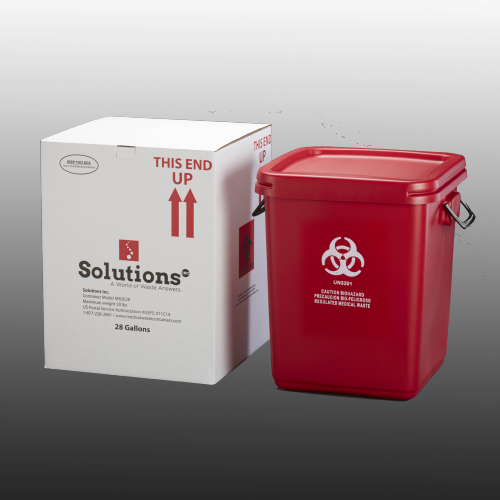Navigating Medical Garbage Disposal: Essential Services for Health Care Facilities
Healthcare centers, whether little clinics or large health centers, are left with the duty of handling, treating, and disposing of a wide variety of medical waste streams. Comprehending the necessary services that sustain medical waste disposal is not just a matter of conformity but likewise a fundamental element in safeguarding public wellness and environmental wellness.
Regulatory Conformity Support
For healthcare centers, ensuring regulatory conformity support is essential to preserve correct handling and disposal of medical waste. Adhering to policies stated by companies such as the Environmental Security Firm (EPA) and the Occupational Safety and Wellness Administration (OSHA) is important to protect against environmental contamination, shield public health, and prevent prospective lawful consequences. Governing conformity assistance supplies healthcare facilities with support on just how to effectively set apart, store, transport, and dispose of various kinds of medical waste according to regional, state, and government policies. This assistance consists of aid in developing and implementing detailed waste monitoring strategies, performing normal team training sessions, and carrying out audits to guarantee continuous compliance. By partnering with regulatory conformity experts, medical care centers can remain current on evolving policies, mitigate threats linked with inappropriate garbage disposal, and inevitably add to a more secure and more sustainable environment for all.
Waste Segregation Advice

Healthcare facilities have to provide clear standards and training to staff on how to segregate waste effectively. This consists of dividing basic waste from hazardous materials such as sharps, infectious waste, drugs, and chemical waste.
Collection and Transportation Solutions

Proper collection and transport solutions are crucial components of the medical waste disposal procedure in health care facilities. These solutions make certain that harmful materials are taken care of safely and in conformity with guidelines to protect both the setting and public health. Healthcare centers depend on specialized waste administration companies to provide reliable collection and transport services customized to their needs.
Medical waste collection entails segregating various types of waste at the factor of generation, making use of color-coded bags or bins to identify between basic, dangerous, pharmaceutical, and various other waste streams. Trained workers must perform this task to avoid contamination and guarantee correct disposal. Get More Info When gathered, the waste is carried in specialized cars furnished to handle hazardous materials securely. These cars comply with stringent safety standards and adhere to assigned courses to certified therapy centers for disposal through methods such as incineration, sanitation, or landfilling.
Therapy and Disposal Solutions
In the realm of medical waste disposal for healthcare centers, after the critical phase of collection and transport solutions, the focus changes in the direction of executing efficient treatment and disposal remedies. Treatment solutions often include processes such as autoclaving, which makes use of heavy steam under pressure to decontaminate the waste.
Disposal remedies encompass the final step in the clinical waste monitoring process. Reusing and source recuperation are also acquiring grip as sustainable disposal options for specific kinds of clinical waste products.
Efficient therapy and disposal remedies are paramount in making sure conformity with regulations and protecting public health and wellness and the atmosphere. Medical care centers have to thoroughly examine and pick ideal approaches that align with their waste administration goals and sustainability initiatives.
Personnel Training and Education

To properly handle medical waste disposal in medical care centers, thorough staff training and education and learning play a vital duty in making sure adherence to governing requirements and preserving a safe setting. Proper training equips team with the understanding and skills required to take care of various sorts of clinical waste, segregate them properly, and package them securely for disposal. By enlightening staff members on the dangers related to inappropriate handling of medical waste, centers can minimize the possibility of accidents, contamination, and regulative violations.

Final Thought
In final thought, medical care centers rely upon necessary clinical garbage disposal solutions to make certain regulatory compliance, appropriate waste partition, risk-free collection and transport, efficient therapy and disposal, as well as staff training and education. These services play an important duty in keeping the health and wellness of both medical care employees and the general public, highlighting the value of correct monitoring of clinical waste in health care settings.
For health care facilities, making sure regulative compliance support is essential to maintain correct handling and disposal of medical waste. Waste partition includes categorizing different kinds of clinical waste to make certain ideal handling, therapy, and check that disposal. This includes dividing basic waste from harmful products such as sharps, infectious waste, pharmaceuticals, and chemical waste.Clinical waste collection includes segregating different kinds of waste at the factor of generation, utilizing color-coded bins or bags to differentiate between general, unsafe, pharmaceutical, and other waste streams.In the realm of clinical waste disposal for health care facilities, after the crucial phase of collection and transportation solutions, the emphasis shifts towards implementing reliable treatment and disposal remedies.
Comments on “Tailored Medical Waste Disposal Services: Personalized Solutions for Your Demands”